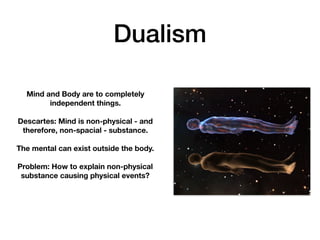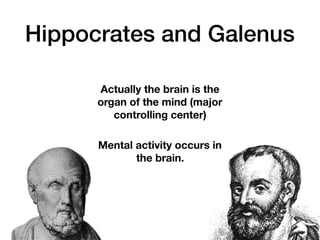Class5 - The Mind-brain Problem
- 1. The talking Brain LCD 105 - Class 5 - Professor Nathacia
- 2. Ok.. we now have a (partial) de’¼ünition for Language ŌĆó Abstract reality that is socially-based, individually-based AND speci’¼ücally-based; ŌĆó It is a Faculty of the mind; ŌĆó It is a cognition.
- 3. Cognition? ŌĆó Oxford: the mental action or process of acquiring knowledge and understanding through thought, experience, and the senses ŌĆó Psychological Glossary: All the mental activities associated with thinking, knowing, and remembering. As you can tell, any of your ideas, thoughts, memories, etc., are all types of cognitive processes. What you are doing (reading and learning this explanation) is a type of cognition.
- 4. Houston, we have a problemŌĆ”
- 5. Dualism Mind and Body are to completely independent things. Descartes: Mind is non-physical - and therefore, non-spacial - substance. The mental can exist outside the body.
- 6. Dualism Mind and Body are to completely independent things. Descartes: Mind is non-physical - and therefore, non-spacial - substance. The mental can exist outside the body. Problem: How to explain non-physical substance causing physical events?
- 7. Materialism There is no mind actually. Everything is physical. What we call mind is actually an epiphenomenon of physical interactions. Radical Behaviorism: mind is an epiphenomenon of stimuli- response relations. Problem: It doesn't explain mental causes as knowledge, expectation and beliefs. Logical Behaviorism: mind is an epiphenomenon of logical relations between a stimulus and a response. Problem: it just explain mental causes in a event-event relation. What happens if thereŌĆÖs no reason for a change of mind? Central-State Identity: mind is an epiphenomenon of neurons arrangement / circuits.
- 9. By Rama, CC BY-SA 3.0 fr, https://commons.wikimedia.org/w/index.php?curid=58036467 The interest for what is inside the head goes back many thousands years BC Trepanning or Trepanation Surgical intervention (alive people) in which a hole was drilled or scraped into a skull
- 10. Hippocrates Actually the brain is the organ of the mind (major controlling center)
- 11. Hippocrates and Galenus Actually the brain is the organ of the mind (major controlling center) Mental activity occurs in the brain.
- 12. Franz Joseph Gall Organology: the isolation of mental faculties. Cranioscopy: reading the skull's shape. Phrenology
- 17. Phineas Gage and the Localization Hypothesis
- 23. Back to relating anatomy and cognition Pierre Paul Broca 1860
- 24. Back to relating anatomy and cognition Pierre Paul Broca 1860
- 25. Back to relating anatomy and cognition Pierre Paul Broca 1860
- 28. BrocaŌĆÖs aphasia Pierre Paul Broca Problems with production of closed class words No problems of comprehension Prosody not a’¼Ćected (or most part of it) Principal conclusion: Language Production and Language Comprehension are (anatomically and physiologically) distinct.
- 29. A different type of disorder Karl Wernicke
- 32. WernickeŌĆÖs aphasia Karl Wernicke Problems with comprehension Problems in making sense (semantics) No problems of articulation or speech production (in the matter of Phonetics, phonology, morphology or syntax - in certain extent) Principal conclusion (con’¼ürmed): Language Production and Language Comprehension are (anatomically and physiologically) distinct.
- 33. Production x Articulation Wilder Graves Pen’¼üeld Cortical Homunculus
- 37. ByMagnolia87(Ownwork)[CCBY-SA3.0(https:// creativecommons.org/licenses/by-sa/3.0)],viaWikimedia Commons Norman Geschwind Integrating all we know Language/ Speech anatomy and physiology by integrating BrocaŌĆÖs area, WernickeŌĆÖs area and the cortexes. Many medical schools still use this model.
- 39. When linguistics and Neuroscience meet David Poeppel The functional anatomic model of language developed with Greg Hickok Lateralization in auditory processing Experimental work on the role of neuronal oscillations in audition and speech perception
- 41. When linguistics and Neuroscience meet Angela Friederici Neurocognitive Model of Auditory Language Comprehension how the processing of syntax and semantics interacts with other linguistic (phonology, prosody) and non-linguistic domains (e.g. memory, emotion, gesture) Experimental work on the role of neuronal oscillations in audition and speech perception
- 42. Friederici (2012): The cortical language circuit: from auditory perception to sentence comprehension http://www.cell.com/trends/cognitive-sciences/fulltext/S1364-6613(12)00079-4





































![ByMagnolia87(Ownwork)[CCBY-SA3.0(https://
creativecommons.org/licenses/by-sa/3.0)],viaWikimedia
Commons
Norman Geschwind
Integrating all we know
Language/ Speech anatomy and
physiology by integrating BrocaŌĆÖs area,
WernickeŌĆÖs area and the cortexes.
Many medical schools still use this model.](https://image.slidesharecdn.com/class5themindbrainproblem-180611183433/85/Class5-The-Mind-brain-Problem-37-320.jpg)




